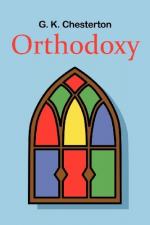
|
| Name: _________________________ | Period: ___________________ |
This test consists of 5 short answer questions, 10 short essay questions, and 1 (of 3) essay topics.
Short Answer Questions
1. What thing does Chesterton despise more than anything else?
2. What is Chesterton's amazement at scientific advancement?
3. What is the title of Chapter I?
4. In fairy tales and fiction, what change does Chesterton name that makes the stories monotonous?
5. In Chapter Two, what drives a man to insanity?
Short Essay Questions
1. Why does Chesterton's second notion of fairyland entail praise?
2. Chesterton ends Chapter II, The Maniac, with a look at the true skeptic. What picture does this man present? How does he relate to the man at the beginning of the chapter, the man who believed in himself?
3. Chesterton says that a perfect view of the world combines a searching mind with the feeling of being welcomed. What does this mean? How does it relate to Christianity?
4. Poetry is the only thing that keeps a man sane, while reason drives him insane. How does Chesterton support this argument, and is it plausible?
5. Why does Chesterton say that the act of willing is a limiting act? Could it be freeing instead? What happens if you attempt to free something from the laws of its nature?
6. What role does Mr. G. S. Street play in the book?
7. How does Chesterton explain the idea of the madman in life, in experience? How does this person live in the world?
8. Why does Chesterton claim that fairyland is more rational than the scientific world? Does the sense of wonder remain?
9. In Chapter I, Introduction in Defense of Everything Else, Chesterton states that the book is written from his own experiences rather than as the result of research and labor. What expectations does this set up or destroy for the reader?
10. Chapter II, The Maniac, begins with the idea that man believing in himself is a weakness. Chesterton asserts this in the face of modern thinking, which says believing in oneself is the strongest way to live. What reasons does Chesterton give for asserting this statement?
Essay Topics
Write an essay for ONE of the following topics:
Essay Topic 1
Why is solemnity more natural to man than laughter is? How is this related to Chesterton's claim that man is fundamentally joyful?
Essay Topic 2
What is the mindset of the madman? How does it differ from a sane man and how is it similar to a materialist? What is Chesterton's answer to this mindset? Does this answer take into account all aspects of the mindset?
Essay Topic 3
What comfort does Chesterton find in the thought that God hides his mirth from man? How does that picture speak to God's greatness? How does it reinforce the idea that man is full of joy? Draw your arguments from Chesterton's statements about God's character which are given throughout Orthodoxy.
|
This section contains 1,546 words (approx. 6 pages at 300 words per page) |

|




